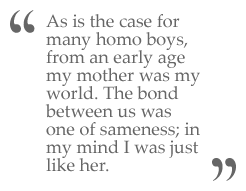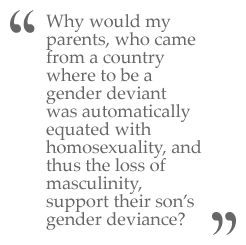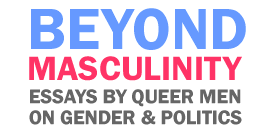 As is the case for many homo boys, from an
early age my mother was my world. The bond between us
was one of sameness; in my mind I was just like her. My
mother is fond of reminding me of how as a baby she
alone had the power to stop my tears. To this day, she
is still one of the few people that can get me to shut
up. Given the close affinity between my mother and me,
when my parents would fight I would stand at her side
ready to battle my father, and often my older brother as
well. It wouldn’t matter who was wrong or right, but
simply that my mother was threatened. Since I saw my
mother as not only my role model but as the source from
which I had sprung, when she was threatened I was
threatened.
As is the case for many homo boys, from an
early age my mother was my world. The bond between us
was one of sameness; in my mind I was just like her. My
mother is fond of reminding me of how as a baby she
alone had the power to stop my tears. To this day, she
is still one of the few people that can get me to shut
up. Given the close affinity between my mother and me,
when my parents would fight I would stand at her side
ready to battle my father, and often my older brother as
well. It wouldn’t matter who was wrong or right, but
simply that my mother was threatened. Since I saw my
mother as not only my role model but as the source from
which I had sprung, when she was threatened I was
threatened.
Often
the fights between my parents were about the bond of
affinity between my mother and me. My father accused her
of spoiling me, which in our working class home had
strong undertones of feminization and emasculation. In
claiming that my mother was spoiling me, my father was
really saying that she was turning me into a non-boy.
His accusations were further complicated by his
patronizing of my older brother as his Chosen Son.
Subtly undermining my mother’s authority over him, my
father drew my older brother into his orbit as an ally.
As time wore on, those battle lines became entrenched
gender lines dividing us into two opposing camps: my
father and older brother as the men and my mother and I
as the women. It was in those moments of anger, of a
family divided along lines of what I can only call queer
genders that my own unique place in my family began to
emerge.
My queer gender developed out of those
fights within my family. While never openly named by
either of my parents, they had tacitly agreed that I was
to be raised differently from my clearly male-gendered
brothers. I was to be the culerito. [ 7 ]
As a child, I was the son taught to cook, clean, listen
and nurture. At the never-ending string of quinceañeras,
birthday parties, and baptismal celebrations, I was
always with the women. I would sit among my mother,
grandmother, aunt, godmother, and a host of their
friends, listening to them gossip about one another, or
lovingly (yet critically) pick at their husbands, their
sons, and their daughters. Meanwhile, my brothers would
play with other boy-children. My inclusion in these
circles of women was never questioned, at least while I
was present. If whispered conversations of concern about
my affiliation with women happened between my mother and
her women friends, I was not aware.
My connection to femininity extended to
include the toys I played with. I didn't think it odd
that I played with Barbies or “My Little Ponies,” or
that my role model was the 1980’s
fashionista / philanthropist / superhero Jem. Thanks to my
mother’s protective embrace, I was free to be myself -
plastic Mattel dolls and all. What strikes me as
interesting now, from my postmodern, sub-altern, queer,
Latino, male vantage point, is how lovingly my family
embraced my deviant gender/racial expressions. Sure
there were occasional bouts of homophobia on the part of
my father, but the overwhelming response from my family
was acceptance. Whenever my brothers and I played with
our G.I. JOES or X-Men, I was always the one in charge
of the women action figures. There was never any
criticism. I simply was.
The
relative acceptance of my family was matched by the
unease I felt towards the world “out there.” I
don't really remember an exact moment when I became
conscious of the fact that my love for girl-child toys
and women superheroes was a private matter - a
matter of the home and family. Somehow I just understood
that it was not okay for me to take my dolls out of the
home. Whenever I played with the other children in my
apartment complex, I never mentioned that my favorite
G.I JOE was Scarlett, the red haired counter-terrorist
vixen of the team, and I certainly never dared to bring
her out with me to play.
 Like my constant transitions
from English and Spanish between school and home, I also
switched my gender performance from home to the outside.
The queer child I was inside my home butched it up
whenever I crossed the threshold of our door. It took me
many years to understand the unnamed acceptance of my
queer gender by my family. Why would my parents, who
came from a country where to be a gender deviant was
automatically equated with homosexuality, and thus the
loss of masculinity, support their son’s gender
deviance? To better understand my parents’ integration
of my queerness into our family the only way they knew
how, as another type of gendered child, I had to
understand the discourses that had informed my parents’
understanding of gender and sexuality in El Salvador.
Like my constant transitions
from English and Spanish between school and home, I also
switched my gender performance from home to the outside.
The queer child I was inside my home butched it up
whenever I crossed the threshold of our door. It took me
many years to understand the unnamed acceptance of my
queer gender by my family. Why would my parents, who
came from a country where to be a gender deviant was
automatically equated with homosexuality, and thus the
loss of masculinity, support their son’s gender
deviance? To better understand my parents’ integration
of my queerness into our family the only way they knew
how, as another type of gendered child, I had to
understand the discourses that had informed my parents’
understanding of gender and sexuality in El Salvador.
Throughout Latin America and in El Salvador,
homosexuality is understood primarily as a matter of
gender. Homosexual behavior - particularly the act of
penetration - determines to a large degree whether one
is or isn’t a man. Maricónes, culeros, and
putos are all words that name the non-maleness of
the homosexual in the traditional Latin American
conceptualization of homosexuality. Mexican
anthropologist Héctor Carrillo describes the traditional
operation of this gender-sexuality system in Mexico as
creating men through non-men. He writes,
[p]rior to the
adaptation of an understanding of categories of sexual
identity and sexual orientation, Mexican society
dichotomized men almost exclusively into two broad
categories that were defined by demeanor. Masculine men
were hombres or machos. Their counterparts
were the effeminate men, the maricones, who were
perceived as having forfeited their manhood altogether.
The existence of the latter confirmed the ‘normality’ of
the former. The hombres - those who were seen as
legitimately manly and who were allowed to assert their
dominance via the abuses of machismo - needed the
maricones as a point of reference that defined where
manhood ended. [ 8 ]
The
location Latin American homosexuals occupy is critical
for legitimizing the normative masculinity of
heterosexual men. In the traditional understanding of
homosexuality in Latin America, homosexual male-bodied
individuals are not men at all. Instead, they are seen
as another type of gender category altogether, existing
in a shifting location between women’s femininity and
men’s bodies. Carrillo’s observations of Mexican
homosexuality hold true for much of Latin America. In
fact, many names for male homosexuals throughout Latin
America speak to this in-between gendered status. [ 9 ]
In most of its Latin American articulations
homosexuality is a matter of gender, not sexual
identity... (continue reading)




5 COMMENTS ON THIS ESSAY:
Great essay!Very proud of you for writing this.
GREAT ESSAY!!! good work.
amazing!
i'm so very proud of you, Daniel.
hello daniel
i was wondering, is there maybe a spanish version of your article?
(i would like a spanish/french friend of mine who's lived in latin america for some years to read your piece, and english is difficult for her)
daniel mang
toulouse/france